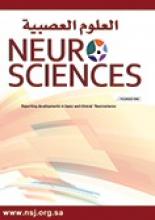Abstract
OBJECTIVE: To study the quality of life (QOL) and psychiatric symptoms in epilepsy patients at the Jordan University Hospital (JUH), and to compare these findings with those from Middle Eastern and Western literature.
METHODS: Fifty epilepsy patients, aged 18 years, or older, attending the Neurology Clinic at Jordan University Hospital, Amman, Jordan over a 6-month-period from March to September 2009, were requested to complete a questionnaire on QOL in epilepsy, as well as a neuropsychiatric inventory, both translated into Arabic.
RESULTS: The patients’ mean age was 37.6 years, with 26 males, and 24 females. Only 2 patients were divorced and 3 lost their job due to epilepsy. During the year prior to the study, 40% of patients had less than one attack/month and 32% were seizure-free. Two-thirds of patients had tonic-clonic seizures. Most (84%) did not sustain injuries due to the seizures. Approximately 3/4 of patients (73.4%) stated that their seizures were very well controlled with antiepileptic drugs, which did not lead to major side effects. Forty-two patients (84%) did not have any restriction of daily activities due to epilepsy and substantial proportions (range 52-88%) did not perceive any impact of epilepsy on aspects of daily living. Feelings of stigma were noticed in only 7 patients. Mild depression was noted in 42% of patients.
CONCLUSION: Compared with others, this study shows a good QOL in patients with epilepsy, less stigma, and little impact of epilepsy on daily living with, however, similar to other reports, a significant rate of depression, which could have been alleviated by better family and social support.
- Copyright: © Neurosciences
Neurosciences is an Open Access journal and articles published are distributed under the terms of the Creative Commons Attribution-NonCommercial License (CC BY-NC). Readers may copy, distribute, and display the work for non-commercial purposes with the proper citation of the original work.






